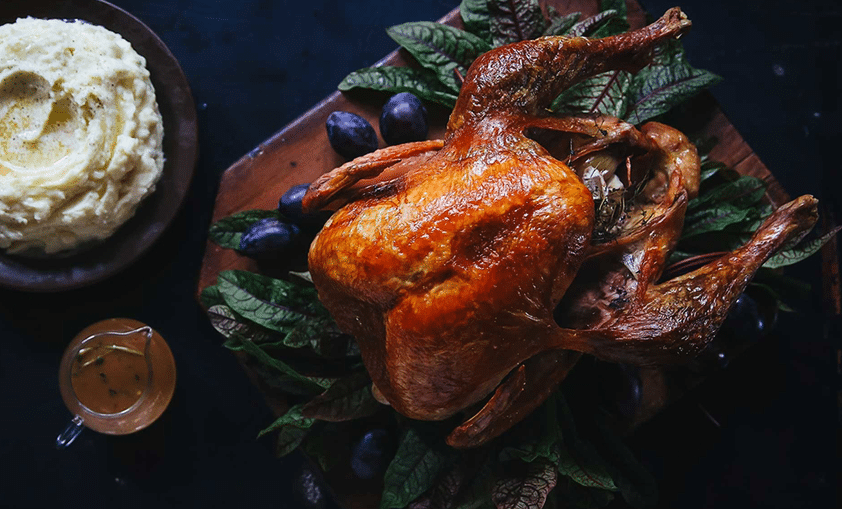Growing up, Thanksgiving was a big deal in my family. Mostly, because it was a reason for my large extended family to gather together. We had some fun, and of course ate some delicious food as well.
But we never did that thing you always see on TV where everyone goes around the table and says what they’re thankful for. Which meant that, to me, the holiday was always much more about fun and togetherness than it was about being grateful.
Once I moved away to go to school halfway across the country, this holiday started to feel a little bleak and lonely to me.
I think that holidays in general can feel this way when we’re single and perhaps far away from those we love.
But when it comes to Thanksgiving, we shouldn’t let these bleak feelings get in our way and keep us from celebrating what the holiday is actually about.
Here are three considerations to help cultivate gratitude in our lives, even if we’re not feeling it one bit when it comes to our present life circumstances.
1. Gratitude is a virtue

First, let’s call this general idea of thankfulness that’s at the root of the Thanksgiving holiday what it really is: a virtue.
Now, the Catechism of the Catholic Church doesn’t specifically list “gratitude” as a virtue. But it is pretty clear that the Church has always considered a disposition of thankfulness to be good.
We can look to the Gospels to see that. Christ praised gratitude. When He cleansed the ten lepers but only one returned to thank Him:
“He fell at the feet of Jesus and thanked him. . . Jesus said in reply, ‘Ten were cleansed, were they not? Where are the other nine? Has none but this foreigner returned to give thanks to God?'”(Luke 15-18).
This Gospel story is definitely not the only place we find gratitude in Scripture.
The Old Testament contains numerous instructions about the proper way to make a thanksgiving offering in the Mosaic law. Several of the Psalms are entirely prayers of thanksgiving.
Beyond this, we can also look at the four main types of prayer mentioned in the Catechism. These are petition, adoration, reparation, and thanksgiving. Even the word “Eucharist” itself means “thanksgiving.”
It is pretty clear that being thankful to God is important, good, and meritorious. But unfortunately, like most of the virtues we should be cultivating in our daily lives, it’s not always very easy to live out.
2. Be purposeful in your thankfulness

There’s a reason the tradition of going around the table and sharing what you’re thankful for is so common. We’ve probably seen it in pretty much ever Thanksgiving sitcom out there. To our modern culture, it’s one of the only ways to make sure we’re actually being thankful, rather than taking our blessings for granted.
A general feeling of thankfulness doesn’t do us much good by itself. But we can cultivate a purposeful expression of our gratitude toward the God who gave us everything.
It’s easy to take our blessings for granted. It’s especially easy to do if there are any life circumstances that are making us pretty nearly miserable right now.
So it can be helpful to make a point of thanking God specifically for His blessings at a certain time each day. This isn’t something to do only on Thanksgiving! Perhaps you can make this thanksgiving part of a morning offering prayer, or at the start of any daily mental prayer time, or before going to sleep at night.
The important thing is that we make a point of thanking Him, even when we don’t feel like it. Even when our misery seems to overshadow all the good things in our life, there is always going to be something to thank Him for.
3. Meditate about God’s gifts

The reality is that there are times in all our lives when things feel so bleak that it seems like practically the only thing left to thank God for is life itself. But we can start there, and we can acknowledge that He holds us in existence each moment.
We’ve all had times in life where we’ve felt like this. It can be helpful to spend some time in prayer focusing on what God has done for us in a broader sense than in our present personal life.
He sent his Son to die a terrible death for us. God saved us from eternal punishment. Our Father has a spot in Heaven prepared for our eternal happiness. He has wisely planned out unimaginable graces and joys for us, and he has given us the free will to accept or reject them.
Sometimes, some more general considerations of how he has loved humanity can help us move to a deeper love and appreciation of how he has blessed us personally.
But even if the thankful feelings don’t begin to flow, we can choose to submit to him and to trust his love for us, knowing that his plan for us is perfect.



